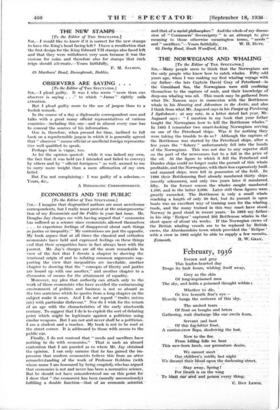ECONOMISTS AND THE PUBLIC
[To the Editor of THE SPECTATOR.] SIR,—I imagine that disgruntled authors are most unwelcome correspondents, but I really must protest at the misrepresenta= tion of my Economists and the Public in your last issue. Mr. Douglas Jay charges me with having argued that " economics has sUffered as a science since economists allowed themselves . . . to experience feelings of disapproval about such things as justice or inequality." My contentions are just the opposite.
My book argues that at all times the classical and orthodox economists have held and expressed feelings on these things end that their sympathies have in fact always been with the
poorest. Mr. Jay's charges are all the more remarkable in view of the fact that I devote -a chapter to shoiring the
irrational origin of and to refuting common arguments sup- porting the view that inequalities are inevitable, another chapter to showing that the " concepts of liberty and justice are bound up with one another," and another chapter to a discussion of means for the attainment of equality.
Moreover, my plea that authority can attach only to the work of those economists who have avoided the embarrassing
environment of politics and business is not so absurd as
the two sentences which he quotes from a long chapter on the subject make it seem. And I do not regard " trades unions (sic) with particular disfavour." Nor do I wish for the return
of an age with the characteristics of the early nineteenth century. To suggest that I do is to exploit the sort of debating point which might be legitimate against a politician using similar weapons. But I am not and never shall be a politician. I am a student and a teacher. My book is not to be read at the street corner. It is addressed to those with access to the public car.
Finally, I do not contend that " needs and sacrifices have nothing to do with economics." That is such an absurd contention that I am puzzled as to where Mr. Jay obtained the opinion. I can only surmise that he has gained the im- pression that modern economists believe this from an utter misunderstanding of the work of Professor Robbins (with whose name I am honoured by being coupled), who has argued that economics is not and never has been a normative science; But he should not have misunderstood me on this point for I show that " the economist has been (usually unconsciously) fulfilling a double function—that of an econonnic scientist' andAhat.of a social philosopher.” And the whole of my discus- sion of " Consumer's' Sovereignty " is an attempt to give meaning to those otherwise meaningless terms, " needs
and ," sacrifices."—Yours.faithtully, W. H. Hurr. 68 Derby Road, South Woodford, E.18.










































 Previous page
Previous page